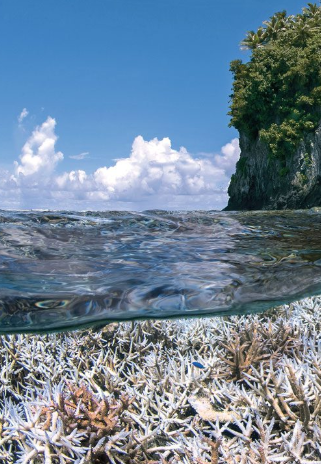Reef heat prompts re-evaluation
 Climate change and warming seas are making decades of conservation knowledge less useful.
Climate change and warming seas are making decades of conservation knowledge less useful.
Many of the world’s coral reefs - including Australia’s Great Barrier Reef - are seeing biodiversity plunge in the face of repeated coral bleaching events.
Marine reserves have been used for decades to enhance biodiversity and fish biomass by preventing damage and over-exploitation by fishing.
However, a new study highlights that tropical coral reef marine reserves can offer little defence in the face of climate change impacts. And the changes that are being observed will force scientists, conservationists and reserve managers to rethink the role these protected areas can bring.
“Climate change is so fundamentally changing the structure and composition of coral reef ecosystems, that the way the ecosystem functions and responds to common management and conservation approaches needs to be carefully re-evaluated,” explains Professor Nick Graham of Lancaster University, lead author of the study.
“The rules we have come to rely on, no longer apply.”
The study focused on coral reefs in Seychelles which were badly affected by a bleaching event in 1998, when around 90 per cent of the coral died.
“Our long-term records of Seychelles' coral reefs show that before the bleaching event marine reserves contained high coral cover, a very biodiverse range of fish, and high biomass of carnivorous and herbivorous fish,” Professor Graham says.
“Following the bleaching event, the role of the marine reserves changed substantially. They no longer supported higher coral cover compared to adjacent fished areas, and their role in enhancing biodiversity decreased. Plant-loving fish, such as rabbitfish and parrotfish, dominated fish communities. This was the case for reefs where corals were recovering, as well as reefs transformed and dominated by seaweed.”
Reduced numbers of carnivorous predators, such as grouper and snapper species, show reserves are much less effective at protecting the tops of food webs in the years following bleaching events.
These population drops are likely due to fewer fish for them to prey on after the loss of coral reef structures.
Dr Shaun Wilson, of the Department of Biodiversity, Conservation and Attractions in Western Australia, a co-author on the study, said: “Despite these climate-driven transformations, marine protected areas still have a role to play in ocean conservation. It is encouraging that marine reserves continue to protect some species, especially when these species are critical for local fisheries”.
If the goal is to protect biodiversity then it may be better to target new marine reserves around those coral reefs where the rate of warming is slowest, or those where recovery from bleaching is more likely.
While the scientists say marine reserves still have an important role to play in protecting fish biomass, they call in their paper for urgent reductions in global greenhouse gas emissions, as well as other pressures such as poor land practices that input nutrients and pollutants to coastal waters, to protect tropical coral reefs.








 Print
Print